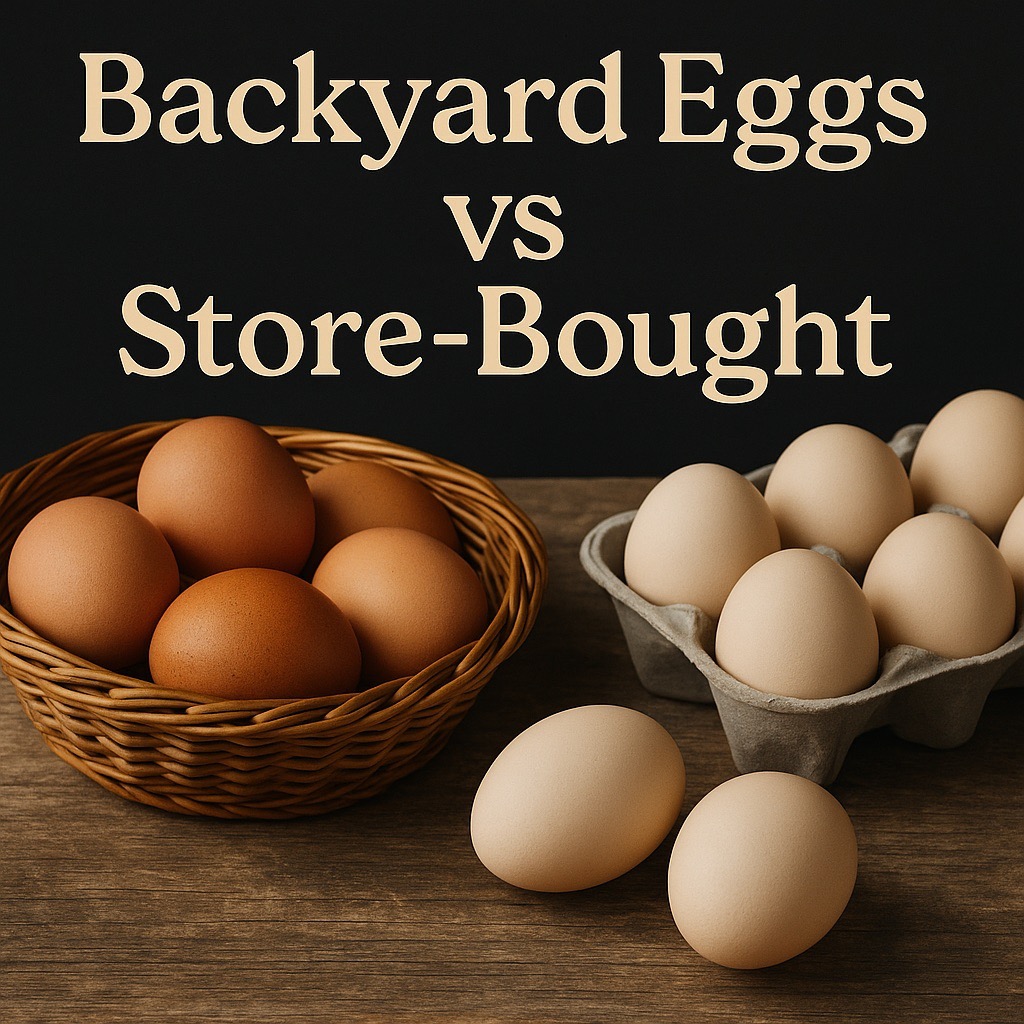Why backyard eggs from your own hens are healthier, cheaper, and more compassionate.
🍳 Backyard Eggs Are Back — And For Good Reason
In a time of rising food prices, health concerns, and industrial farming, many families are rediscovering the value of backyard eggs. These homegrown powerhouses offer more than just breakfast — they represent freedom, nutrition, and faith-filled stewardship.
Unlike store-bought eggs, which often come from caged hens and sit in warehouses for weeks, backyard eggs are fresher, tastier, and far more ethical.
🧪 Backyard Eggs vs Store-Bought: Nutrition Comparison
Scientific studies confirm what backyard chicken keepers have long known: eggs from home-raised hens are significantly more nutritious.
📊 Nutritional Chart
| Nutrient | Store-Bought Egg | Backyard Egg |
|---|---|---|
| Vitamin E | Baseline | +25% |
| Omega-3 Fatty Acids | Baseline | +38% |
| Beta-Carotene | Low | 7x Higher |
| Freshness | 2–6 weeks old | 0–3 days old |
Source: USDA Nutrient Database + Mother Earth News Egg Testing Project
“The diet of a free-ranging hen — insects, greens, grains — directly enhances the nutritional profile of her eggs.”
🌈 Taste, Texture, and Freshness
There’s no comparison. Farm fresh eggs offer:
- Vibrant orange yolks
- Thicker whites
- Fuller flavor
- Zero bleach or synthetic washing
- Collected same-day from a known source
Store eggs, in contrast, can be up to 45 days old when you crack them.
💵 Cost Comparison: Backyard Eggs Save You Money
Let’s look at annual math for a 4-hen flock:
- Eggs laid per year: 800–1,000
- Store value (avg $5/dozen): $330–$420
- Feed cost: ~$120/year
- Coop (one-time or DIY): $200–$500
- Net savings over 2+ years: Hundreds of dollars annually
Plus:
- Free garden fertilizer (chicken manure)
- Lower grocery dependence
- Waste reduction from food scraps
🥚 One hen can lay over 250 eggs a year — that’s sustainable protein on autopilot.
✝️ Ethical & Biblical Stewardship
Factory-farmed eggs come with painful realities: tight cages, clipped beaks, and minimal care. Backyard eggs? Entirely different.
“The righteous care for the needs of their animals…” — Proverbs 12:10
Raising your own hens gives you control — and conviction. Your animals are loved, not exploited. Your food is harvested with gratitude, not guilt.
For believers, it’s a simple act of obedience: care for creation well.
🧠 Frequently Asked Questions About Backyard Eggs
Q: Are backyard eggs safer than store-bought eggs?
Yes — when properly handled, backyard eggs are often safer. Store-bought eggs are washed, bleached, and refrigerated early, which removes the protective “bloom” (a natural coating that keeps bacteria out). Backyard eggs, when collected and stored correctly, retain this natural barrier, extending shelf life and reducing contamination risk.
Just follow these safety tips:
- Collect eggs daily to avoid spoilage
- Don’t wash them until ready to use
- Store visibly dirty eggs in the fridge, clean gently with warm water
Backyard keepers have control — not factories.
Q: Do I need a rooster for hens to lay eggs?
No — hens lay eggs without roosters. Roosters are only required for fertilization (if you want chicks). For egg production alone:
- No rooster = unfertilized eggs (perfectly edible)
- Bonus: no crowing = happier neighbors
Many city ordinances even ban roosters due to noise. So if you’re just after eggs, your flock is fine without one.
Q: How long do backyard eggs last?
- Unwashed at room temperature: 2–3 weeks
- Unwashed in fridge: up to 3 months
- Washed in fridge: 1–2 months
Tip: Use the “float test.” Place an egg in water:
- Sinks: fresh
- Tilts upward: still safe
- Floats: toss it
Because you collect them fresh, backyard eggs start their shelf life later than store eggs, which are often already 1–3 weeks old when sold.
Q: Can I sell or share extra eggs?
Yes — and many people do! Surplus eggs can:
- Be sold to neighbors or local farmstands
- Traded for produce, baked goods, or supplies
- Shared as gifts to build community
Depending on your location, you may need:
- A “Cottage Food License” or permit
- Proper labeling for resale
- Egg cartons with safe handling instructions
Check your county or state laws for details.
Q: What do backyard chickens eat — and does it affect egg quality?
Absolutely. A hen’s diet directly impacts egg nutrition and taste.
Healthy eggs come from:
- Free-range foraging (bugs, greens, seeds)
- Kitchen scraps (vegetables, fruits, grains)
- Balanced layer feed (with calcium & protein)
Avoid feeding:
- Onions, garlic (can alter taste)
- Raw potato peels, chocolate, avocado, processed food
Chickens that eat well lay better. God’s design proves: input equals output.
Q: How do backyard eggs support self-sufficiency?
Backyard eggs provide:
- A renewable source of protein
- A fallback during grocery shortages
- A barter or gift item in tight economies
- Independence from inflation and supply chains
It’s not just food — it’s resilience. One small flock offers daily provision in uncertain times.
Q: Are backyard eggs more ethical?
Yes — dramatically so. Your hens:
- Have room to roam
- Are not debeaked or caged
- Receive personal care and respect
Most store eggs — even “cage-free” — come from industrial systems. By raising hens yourself, you honor Proverbs 12:10 and treat animals as creations, not commodities.
Q: Do backyard eggs really taste better?
Yes — ask anyone who’s tried them! Backyard eggs tend to have:
- Rich, golden-orange yolks
- Thicker whites
- A creamier texture and deeper flavor
The difference comes from freshness and diet. No artificial feed, no bleach, no long transport. Just real food, close to home.
📚 Related Articles from Paranoid Prophet
- 🍳 Benefits of Raising Backyard Chickens
A full breakdown of why raising chickens supports food freedom, sustainability, and emotional well-being. - 🌿 Genesis and Time Perception
Learn how God’s design of time, rest, and creation cycles connects with modern homesteading and food systems. - 🧠 Proverbs 4:23 – Guarding the Heart
A reflection on internal discipline and how faithful habits extend to the way we live, eat, and care for what God gives us. - 🔥 Peter’s Martyrdom – Courage in Simplicity
Explore what it means to live a quiet, courageous life rooted in daily devotion — even in unseen acts like raising hens.
🔗 Recommended External Articles
- USDA FoodData Central – Standard Egg Nutrition Profile
Official nutrient breakdown for large Grade A eggs.
👉 https://fdc.nal.usda.gov/fdc-app.html#/food-details/171287/nutrients - Backyard Chickens – Store Eggs vs Farm Eggs (Forum Article)
A personal and community-based perspective comparing store-bought and home-raised eggs.
👉 https://www.backyardchickens.com/articles/store-eggs-vs-farm-eggs.75405/ - The Critter Depot – Farm Fresh vs Store Bought Eggs
Breaks down health, color, and ethical sourcing differences.
👉 https://www.thecritterdepot.com/blogs/news/farm-fresh-eggs-vs-store-bought-what-s-the-difference - Northwest Edible Life – Backyard vs Store-Bought Eggs: A Side-by-Side Comparison
Real-life test of color, shell strength, and taste differences.
👉 https://nwedible.com/backyard-eggs-vs-store-bought-eggs-side/
🧠 Final Word
Backyard eggs are more than food. They’re faith in action — a reflection of stewardship, compassion, and community. They nourish not just your body, but your conscience and your connection to creation.




